英语中答yes或no是根据事实的
初一英语一般疑问句试题答案及解析

初一英语一般疑问句试题答案及解析1.—________?—He has big eyes and a small nose.A.What does he look like B.What does he doC.How old is he D.How is he【答案】A【解析】句意:—他长得什么样子的?—他有大眼睛小鼻子。
根据答语,是在询问人的长相,B 询问职业;C询问年龄;D询问身体状况,故选A。
【考点】考查特殊疑问句。
2. ----________ you Li Xiaoming?----Yes, I ________.A.Is , am B.Are, amC.Are, is D.Am, is【答案】B【解析】英语中以yes或no开头回答的问句叫一般疑问句,且其回应只依据事实进行回应.只要事实是肯定的就用肯定回答.事实是否定的,就用否定回答.一般为:肯定回答:Yes, +主语(通常是代词)+助动词,一般不缩写;否定回答:No, +主语(通常是代词)+ 助动词 not.(的缩写形式).注意助动词和人称代词人称与数上同问句保持一致.当be动词是am时,am与not不缩写.上文主语是you,系动词用are,下文主语是I,系动词用am,故选B。
【考点】考查一般疑问句3.– Are those your friends ? – ________.A.Yes, they’re B.Yes, they are C.Yes, those are D.they are【答案】B【解析】句意:那些是你的朋友吗?是的,他们是。
问句中的those,在答语中常用they代替,在简略答语中,they和are不能缩写在一起,故选B。
【考点】考查一般问句的简略答语。
4.—Is this your eraser? —______.A.Yes,it isn’t B.No,this isn’t C.No,it isn’t D.Yes,this is【答案】C【解析】句意:---这是你的橡皮擦吗?--不是。
2024年苏科新版八年级英语上册阶段测试试卷162
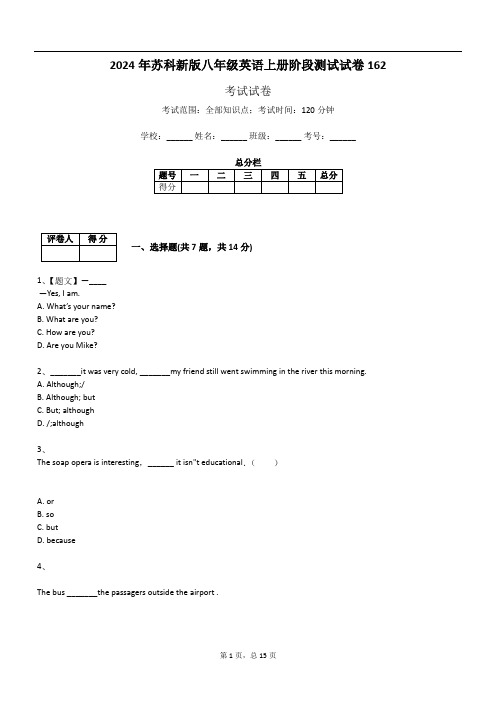
2024年苏科新版八年级英语上册阶段测试试卷162考试试卷考试范围:全部知识点;考试时间:120分钟学校:______ 姓名:______ 班级:______ 考号:______总分栏一、选择题(共7题,共14分)1、【题文】—____—Yes, I am.A. What’s your name?B. What are you?C. How are you?D. Are you Mike?2、_______it was very cold, _______my friend still went swimming in the river this morning.A. Although;/B. Although; butC. But; althoughD. /;although3、The soap opera is interesting,______ it isn"t educational.()A. orB. soC. butD. because4、The bus _______the passagers outside the airport .A. Looks afterB. drops inC. sends forD. picks up5、I could ____ my bed and ____my clothes.A. make; foldB. make; doC. fold; doD. fold ;wash6、The boy looked ____ because he didn"t pass his maths exam.()A. sadB. sadnessC. saddestD. sadly7、There are three magazines on the shelf. One is in Chinese, ____ two are in English.()A. otherB. othersC. the otherD. the others二、填空题(共7题,共14分)8、 --- I think students should have mobile phones to call their parents.--- _______. They often use them to play games and chat with friends insteadA. I hope soB. I don’t agreeC. No problemD. Good idea9、Jim is ______excellent runner. He often comes _____first in the race.A. an , theB. the, theC. a, /D. an, /10、--- I think English is very useful.--- . And we must learn it well.A. I agree with youB. I don't think soC. It's nice of you11、.--- do you play tennis? --- I play three times a week.A. WhatB. HowC. How oftenD. What’s12、We have to stay at home ________ the heavy rain.A. becauseB. because ofC. butD. and13、—Is your sister _____ now?—Yes, she is. And her family members are preparing a party for her _____birthday next month.A. nineteen ; twentiethB. nineteenth ; twentyC. nineteen ; twentieth14、I'm reading an article about smoking____(on/in) the newspaper.三、选择填空(共5题,共10分)15、Did you ________the dustbin? I see it is ________ now.A. empty; emptyB. empty; emptyingC. emptied; emptiedD. empty; emptied16、We should sort our garbage before ________.A. throwing it awayB. throwing them awayC. throwing away itD. throwing away them17、Do you have a box of _________.A. matchB. matchsC. matchesD. match’s18、_______ book do you want to buy?A.WhoA. WhenB. HowC. Which19、- Must I go to the teacher’s office now?- No, you _______.A. mustB. mustn’tC. don’tD. needn’t四、翻译题(共2题,共12分)20、价值21、这个小男孩年龄足够大,可以自己穿衣服了。
初二英语一般疑问句试题答案及解析

初二英语一般疑问句试题答案及解析1. ..Is Tina as tall as you?... She is shorter than meA.Yes, she is B.No, she isn't C.Yes, she does D.No, she doesn't【答案】B【解析】英语中以yes或no开头回答的问句叫一般疑问句,且其回应只依据事实进行回应。
只要事实是肯定的就用肯定回答。
事实是否定的,就用否定回答。
一般为:肯定回答:Yes, +主语(通常是代词)+助动词;否定回答:No, +主语(通常是代词)+ 助动词 not.(的缩写形式).注意助动词和人称代词人称与数上同问句保持一致。
当be动词是am时,am与not不缩写.另外有些助动词的否定回答比较特殊,如:must的否定回答不能用mustn’t,需要特别记住。
句意:蒂娜和你一样高吗?根据下文,她比我矮。
可知前文是否定回答。
故选B。
【考点】考查一般疑问句2. ___you_____to the beach this summer vacation?No ,I went to the village.A.Are ;going B.Do ; go C.Did ; go D.Did ;went【答案】C【解析】句意:你今年暑假去海滩了吗?没有,我去了乡村。
从回答中可知,考查的一般疑问句,而且用的是一般过去时,所以要用助动词did,其后的实意动词go用原形,故选C。
【考点】考查一般疑问句。
3.— do you exercise?— Twice a week.A.How long B.How manyC.How often D.How soon【答案】C【解析】How long多长;How many多少个;How often多久一次;How soon多久. 根据下文,一周两次. 可知选C,你多久做一次锻炼?【考点】疑问词辨析点评:该题型是属于英语考试中的基础题型,是必考内容。
反义疑问句练习题及答案讲解

反义疑问句练习1.Zhou Ming has few English magazines, ________?A.does heB.doesn’t heC.has heD.hasn’t he2.Cindy could hardly speak English three years ago, ________?A. couldn't she?B. could sheC. can she3.Alice had a wonderful time yesterday, _______?A. hadn’t sheB. wasn’t sheC. didn’t sheD. wouldn’t she 4.–She didn’t come to schoolyesterday, did she?–______, though she was not feeling well.A. No, she didn’tB. Yes, she didn’tC. No, she didD. Yes, she did5.---He hardly spent any time on his subjects, ________?---________, so he does badly in his lessons.A .didn’t he, Yes B. did he, Yes C. didn’t he, No D. did he, No 6.He’s read this book before, ?A. hasn’t heB. doesn’t heC. isn’t heD. wasn’t he 7.–Let’s go for a walk, ______?-- OK, I’m coming . Don’t forget to bring your camera, ______? A. will you; will you B. will you; shall weC. shall we; shall weD. shall we; will you8.John had a short walk after lunch, ________?A. did heB. didn't heC. had heD. hadn't he9.Nancy hardly rings you up, ___________?A. doesn’t sheB. does sheC. doesn’t NancyD. does Nancy 10.---Your brother often disagrees with you, _______ he ?--- _______. We often have different opinions.A.does; YesB. doesn’t ;YesC. does; NoD. doesn’t; No 11.Kate’s never late for school,?A.isn’t sheB.hasn’theC.is sheD.has she12.--- Liu Tao has never read the book The Adventure of Tom Sawyer , _______ he?--- _____. He told me it's very interesting. He'd like to read it again.A. is; No, he isn'tB. has; Yes, he hasC. isn’t; Yes, he isD. hasn’t; No, he hasn't13.—He’s never late for school, ________?—No, he isn’t .He is always very early.A. is heB. isn’t heC. hasn’t heD. has he 14.—There’s little meat left in the fridge, ________?—________. I’ll get some on my way home.A. is there, YesB. isn’t there, YesC. is there, NoD. isn’t there, No15.—Tom finished his homework, didn’t he?—__________, though he was ill yesterday.A. No, he didn’tB. Yes, he didC. Yes, he doesD. No, he doesn’t16.There is little water in the cup, ?A. is thereB. isn’t thereC. isn’t itD. is it17. He’s still not understood by his close friend although he has said sorryto him, _________?A. hasn’t heB. has heC. isn’t heD. is he18.You have never visited the place before, you?A. didB. didn’tC. haveD. haven’t19.Don't keep poison in the kitchen, _______?A. do youB. shall weC. will youD. don't you20.There are no museums in our city, _________?A. aren’t thereB. are thereC. is thereD. isn’t there21.Your father is playing the piano very well, he?A.isB.isn’tC.doesD.doesn’t22.—It’s her birthday tomorrow, ______ ?—Yes, let’s have a surprise party for her.A. isn’t itB. isn’t sheC. doesn’t itD. doesn’t she23.--- He’s never stolen anything before, _______ he?--- ________. It’s h is third time to be taken to the police station.A. hasn’t; YesB. has; NoC. has; YesD. is; No24.—It’s her birthday tomorrow, ______ ?—Yes, let’s have a surprise party for her.A. isn’t itB. isn’t sheC. doesn’t itD. doesn’t she25.-----Your father never watched the drama series on TV, __________? -----_____________________. He thinks theses drama series are boring and dull.A.does he; Yes, he does.B. does he; No, he doesn’tC. doesn’t he ; Yes, he does.D. doesn’t he ; No, he doesn’t .26.—Tom is an honest boy, _______ he?—Yes. We trust him all the time.A. isn’tB. isC. doesD. doesn’t27.Good, you’ve done it well! You need no more help from us, ______.?A. do youB. need youC. don’t youD. needn’t you28.His father had an important meeting just now, _______?A. did heB. had heC. didn't heD. hadn't he29.-- You used to be short, didn’t you?-- _______. I was the shortest in my class.A. Yes, I did.B. No, I didn’t.C. Yes, I was.D. No, I wasn’t.参考答案1.A【解析】试题分析:句意为:周明几乎没有英语杂志对吗?这是一个反义疑问句,反义疑问句的结构遵循前肯定后否认或者前否认后肯定,前后人称、时态一致的原则。
反问句如何回答yesorno
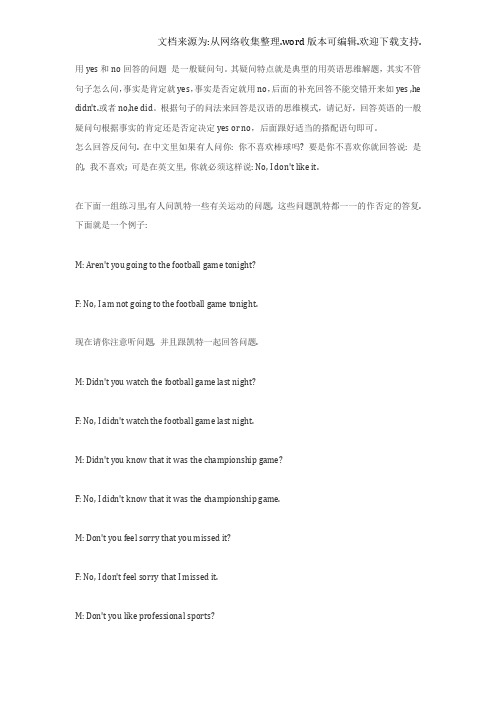
用yes和no回答的问题是一般疑问句。
其疑问特点就是典型的用英语思维解题,其实不管句子怎么问,事实是肯定就yes,事实是否定就用no,后面的补充回答不能交错开来如yes ,he didn't.或者no,he did。
根据句子的问法来回答是汉语的思维模式,请记好,回答英语的一般疑问句根据事实的肯定还是否定决定yes or no,后面跟好适当的搭配语句即可。
怎么回答反问句. 在中文里如果有人问你: 你不喜欢棒球吗? 要是你不喜欢你就回答说: 是的, 我不喜欢; 可是在英文里, 你就必须这样说: No, I don't like it.在下面一组练习里,有人问凯特一些有关运动的问题, 这些问题凯特都一一的作否定的答复. 下面就是一个例子:M: Aren't you going to the football game tonight?F: No, I am not going to the football game tonight.现在请你注意听问题, 并且跟凯特一起回答问题.M: Didn't you watch the football game last night?F: No, I didn't watch the football game last night.M: Didn't you know that it was the championship game?F: No, I didn't know that it was the championship game.M: Don't you feel sorry that you missed it?F: No, I don't feel sorry that I missed it.M: Don't you like professional sports?F: No, I don't like professional sports.M: Don't you think that professional sports are interesting?F: No, I don't think that professional sports are interesting.:“Aren’t you a student? ”的时候,回答no就是“不是学生”。
初中反义疑问句回答

反义疑问句反意疑问句也叫附加疑问句。
它表示提问人的看法,没有把握,需要对方证实。
这一部分的内容在初中英语考试中也是一个常考点,特别是考查学生对疑问句的时态和回答。
反义疑问句的回答用yes,no。
但是,当陈述部分是否定形式时,回答要按事实。
反义疑问句即附加疑问句。
它表示提问人的看法,没有把握,需要对方赞同。
主要形式:陈述部分肯定式+疑问部分否定式;陈述部分否定式+疑问部分肯定式。
陈述部分和疑问部分要么前肯后否,要么前否后肯。
这类反义疑问句有时带有感情色彩,表示惊奇,愤怒,讽刺,不服气,疑惑等。
3反义疑问句由两部分组成:前一部分是一个陈述句,后一部分是一个简短的疑问句,两部分的人称时态应保持一致。
▶定义:反义疑问句表示提问人的看法,没有把握,需要对方赞同。
▶结构:有两部分组成,前一部分为陈述形式,后一部分为疑问句。
▶形式:1.陈述部分肯定句+疑问部分否定句。
前肯后否。
You like bananas, don't you? 你喜欢香蕉,不是吗?2.陈述部分否定句+疑问部分肯定句。
前否后肯。
It's not hot today, is it? 今天天气不热,是吗?▶反义疑问句的回答:Yes/No如:There is some milk in the bottle,isn't there? 瓶子里有一些牛奶,不是吗?— Yes, there is. / No,there isn't . 是的,有/不,没有。
▶陈述句中含有否定意义的词,反义疑问部分用肯定形式。
The old man made no answer, did he? 老人没有回答,是吗?Jim is never late for school, is he? Jim上学从不迟到,是吗?类似否定意义的词还有:seldom, few, little, nobody...▶祈使句的反义疑问句,反义疑问部分用will you。
初三英语一般疑问句试题答案及解析
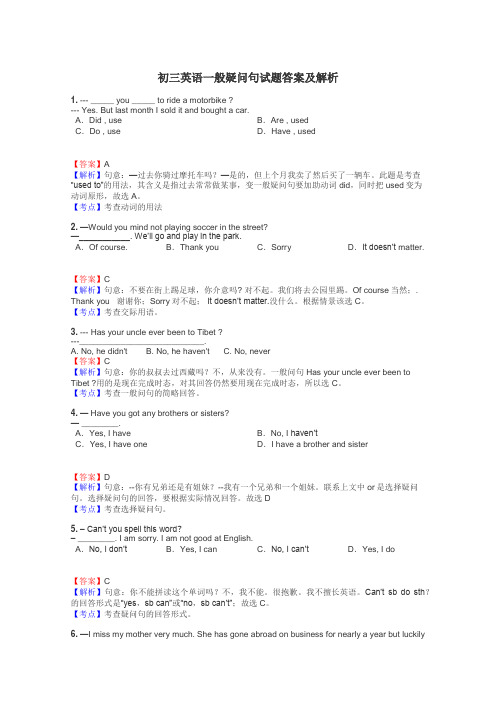
初三英语一般疑问句试题答案及解析1. --- _____ you _____ to ride a motorbike ?--- Yes. But last month I sold it and bought a car.A.Did , use B.Are , usedC.Do , use D.Have , used【答案】A【解析】句意:—过去你骑过摩托车吗?—是的,但上个月我卖了然后买了一辆车。
此题是考查“used to”的用法,其含义是指过去常常做某事,变一般疑问句要加助动词did,同时把used变为动词原形,故选A。
【考点】考查动词的用法2.—Would you mind not playing soccer in the street?—___________. We’ll go and play in the park.A.Of course.B.Thank you C.Sorry D.It doesn’t matter.【答案】C【解析】句意:不要在街上踢足球,你介意吗? 对不起。
我们将去公园里踢。
Of course当然;. Thank you 谢谢你;Sorry对不起;It doesn’t matter.没什么。
根据情景该选C。
【考点】考查交际用语。
3. --- Has your uncle ever been to Tibet ?---___________________________.A. No, he didn'tB. No, he haven'tC. No, never【答案】C【解析】句意:你的叔叔去过西藏吗?不,从来没有。
一般问句Has your uncle ever been to Tibet ?用的是现在完成时态,对其回答仍然要用现在完成时态,所以选C。
【考点】考查一般问句的简略回答。
4.— Have you got any brothers or sisters?— ________.A.Yes, I have B.No, I haven’tC.Yes, I have one D.I have a brother and sister【答案】D【解析】句意:--你有兄弟还是有姐妹?--我有一个兄弟和一个姐妹。
英语中反义疑问句的回答及特殊情况

英语中反义疑问句的回答及特殊情况对反意疑问句的回答,无论问题的提法如何,如果事实是肯定的,就用yes,事实是否定的,就要用no。
要特别注意陈述句部分是否定结构,反意疑问句部分用肯定式提问时,回答yes或no与汉语正好相反。
这种省略回答的yes要译成“不”,no要译成“是”。
例:—He likes playing football, doesn’t he? 他喜欢踢足球,是吗?—Yes, he does. / No, he doesn’t. 是的。
/ 不是。
—His sister didn’t attend the meeting, did she? 他妹妹没有参加会议,是吗?—Yes, she did. / No, she didn’t. 不,她参加了。
/ 是的,她没参加。
简要总结反意疑问句19条:1) 陈述部分的主语是I,疑问部分要用aren't I.I'm as tall as your sister,aren't I?2) 陈述部分的谓语是wish,疑问部分要用may +主语。
I wish to have a word with you, may I?3) 陈述部分用no, nothing, nobody, never, few, seldom, hardly, rarely, little等否定含义的词时,疑问部分用肯定含义。
The Swede made no answer, did he / she?Some plants never blown (开花), do they ?4) 含有ought to 的反意疑问句,陈述部分是肯定的,疑问部分用shouldn't / oughtn't +主语。
He ought to know what to do, oughtn't he? / shouldn't he?5) 陈述部分有have to +v. (had to + v.),疑问部分常用don't +主语(didn't +主语)。
初二英语一般疑问句试题
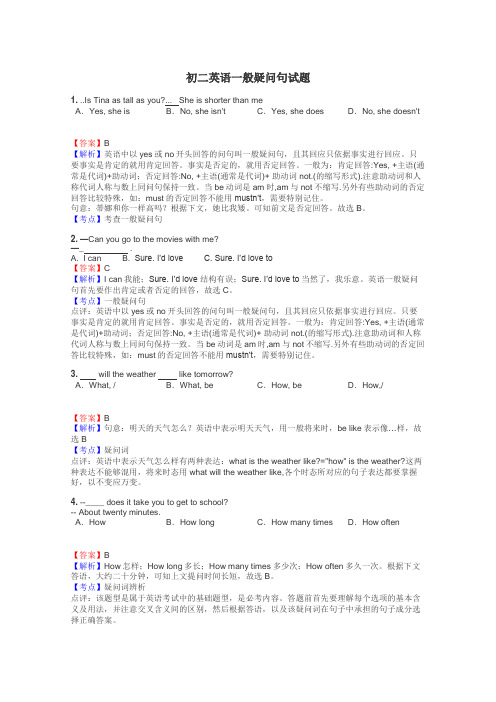
初二英语一般疑问句试题1. ..Is Tina as tall as you?... She is shorter than meA.Yes, she is B.No, she isn't C.Yes, she does D.No, she doesn't【答案】B【解析】英语中以yes或no开头回答的问句叫一般疑问句,且其回应只依据事实进行回应。
只要事实是肯定的就用肯定回答。
事实是否定的,就用否定回答。
一般为:肯定回答:Yes, +主语(通常是代词)+助动词;否定回答:No, +主语(通常是代词)+ 助动词 not.(的缩写形式).注意助动词和人称代词人称与数上同问句保持一致。
当be动词是am时,am与not不缩写.另外有些助动词的否定回答比较特殊,如:must的否定回答不能用mustn’t,需要特别记住。
句意:蒂娜和你一样高吗?根据下文,她比我矮。
可知前文是否定回答。
故选B。
【考点】考查一般疑问句2.—Can you go to the movies with me?—_ .A. I canB. Sure. I’d loveC. Sure. I’d love to【答案】C【解析】I can我能;Sure. I’d love 结构有误;Sure. I’d love to当然了,我乐意。
英语一般疑问句首先要作出肯定或者否定的回答,故选C。
【考点】一般疑问句点评:英语中以yes或no开头回答的问句叫一般疑问句,且其回应只依据事实进行回应。
只要事实是肯定的就用肯定回答。
事实是否定的,就用否定回答。
一般为:肯定回答:Yes, +主语(通常是代词)+助动词;否定回答:No, +主语(通常是代词)+ 助动词 not.(的缩写形式).注意助动词和人称代词人称与数上同问句保持一致。
当be动词是am时,am与not不缩写.另外有些助动词的否定回答比较特殊,如:must的否定回答不能用mustn’t,需要特别记住。
全国通用版初三英语反意疑问句必考知识点归纳

(每日一练)全国通用版初三英语反意疑问句必考知识点归纳单选题1、—Don’t stay up too late any longer, ________?—Thanks. I know it is bad for my health.A.do youB.will youC.won’t youD.shall you答案:B解析:句意:——别再熬夜了,好吗?——谢谢。
我知道这对我的健康有害。
考查反意疑问句。
除了Let’s...用shall we,祈使句的反意疑问句will you的形式,故选B。
2、—This zoo isn't open to the public on Mondays,________?—No,it isn't.A.is itB.isn't itC.will itD.won't it答案:A解析:句意:——这个动物园在星期一不面向公众开门,是吗?——是的,不开门。
此处是反义疑问句,前半句是否定句,后半句用肯定句,前半句的助动词isn’t,故此处的助动词用is,故选A。
3、There used to be a church in the small town, _______?A.used thereB.usedn’t itC.used itD.usedn’t there答案:D解析:句意:过去这个小镇上有一座教堂,不是吗?考查There be句型的反意疑问句。
根据英语语法,There be句型和used to连用时,它的反意句的省略部分有两种做法:didn’t there或usedn’t there。
D选项符合句意,故选D。
4、They have breakfast at home, __________ they?A.haveB.haven’tC.don’tD.do答案:C解析:句意:他们在家吃早餐,不是吗?考查反意疑问句。
反意疑问句遵循“前肯后否,前否后肯”原则,陈述句是肯定句,所以反问部分是否定,排除AD选项,另外have“吃”,是实义动词,反问部分需借助助动词do。
疑问句中含有否定词回答yesno

疑问句中含有否定词回答yesno【篇一:疑问句中含有否定词回答yes,no】你说的是不是反意疑问句?举个例子吧1.you are a teacher,arent you?或2.you arent a teacher,are you?第一个如果你是,就回答yes,i am.不是回答no,im not.第二个一样.所以英文的回答就是拿肯定的陈述问自己,到底是不还是不是,是就yes,不是就no.不要被它的否定陈述搞混.中文的回答上就有点出入了,比如第一个问你难道你不是老师吗,如果是你会回答不,我是.如果不是就会回答是的,我不是.而第二个问你你不是老师,对吗?如果你是老师就要回答不,我是.如果你不是老师,就回答是的,我不是老师【篇二:疑问句中含有否定词回答yes,no】中文习惯先对以上问句肯否作出判断再回答事实但在英文中不要对以上的问句肯否作出判断直接回事实yes or no是或不是但在翻译时要根据中文习惯对以上肯否作判断所以就形成了一个差异但翻译是给中国人听的所以要把英文中的yes翻译成否no翻译成是总之记住三点一据实回答二前肯后肯前否后否三no与yes的翻译附否定疑问句和一般疑问句回答相同列are you a student?yes i am arentyou a student?yes i am.【篇三:疑问句中含有否定词回答yes,no】一、不用疑问词,但需要用yes或no回答的疑问句,叫一般疑问句。
句末用问号“?”。
一般疑问句的基本用法及结构一般疑问句用于对某一情况提出疑问,通常可用yes和no来回答,读时用升调。
其基本结构是“be / have / 助动词+主语+谓语(表语)”:is he interested in going? 他有兴趣去吗?have you ever been to japan? 你到过日本吗?does she often have colds? 她常常感冒吗?did you ask her which to buy? 你问没问她该买哪一个?二、陈述句变一般疑问句的方法1. 动词be的疑问式:动词be根据不同的时态和人称可以有am,is, are, was, were等不同形式,可用作连系动词(表示“是”、“在”等)和助动词(用于构成进行时态和被动语态等),但不管何种情况,构成疑问式时,一律将动词be的适当形式置于句首:句型:be动词+主语~?is your father angry?你父亲生气了吗?yes,he is.是的,他生气了。
初一英语主谓一致试题
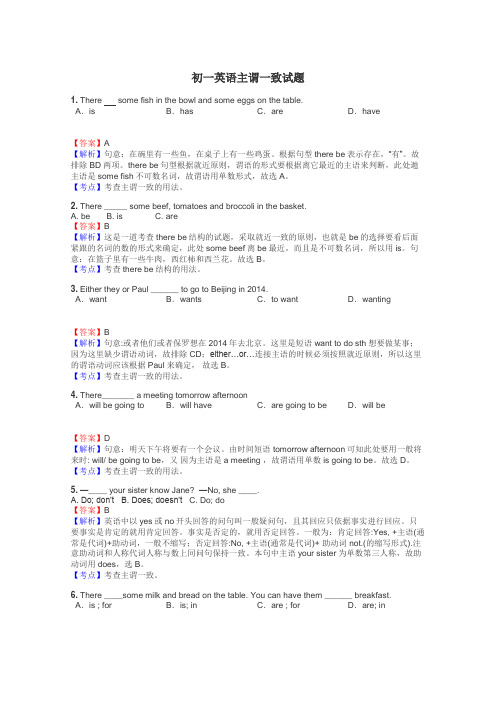
初一英语主谓一致试题1. There some fish in the bowl and some eggs on the table.A.is B.has C.are D.have【答案】A【解析】句意:在碗里有一些鱼,在桌子上有一些鸡蛋。
根据句型there be表示存在,“有”。
故排除BD两项。
there be句型根据就近原则,谓语的形式要根据离它最近的主语来判断,此处逇主语是some fish不可数名词,故谓语用单数形式,故选A。
【考点】考查主谓一致的用法。
2. There _____ some beef, tomatoes and broccoli in the basket.A. beB. isC. are【答案】B【解析】这是一道考查there be结构的试题,采取就近一致的原则,也就是be的选择要看后面紧跟的名词的数的形式来确定,此处some beef离be最近,而且是不可数名词,所以用is。
句意:在篮子里有一些牛肉,西红柿和西兰花。
故选B。
【考点】考查there be结构的用法。
3. Either they or Paul ______ to go to Beijing in 2014.A.want B.wants C.to want D.wanting【答案】B【解析】句意:或者他们或者保罗想在2014年去北京。
这里是短语want to do sth想要做某事;因为这里缺少谓语动词,故排除CD;either…or…连接主语的时候必须按照就近原则,所以这里的谓语动词应该根据Paul来确定,故选B。
【考点】考查主谓一致的用法。
4. There_______ a meeting tomorrow afternoonA.will be going to B.will have C.are going to be D.will be【答案】D【解析】句意:明天下午将要有一个会议。
由时间短语tomorrow afternoon可知此处要用一般将来时: will/ be going to be,又因为主语是a meeting ,故谓语用单数is going to be。
初一英语一般疑问句试题答案及解析

初一英语一般疑问句试题答案及解析1. _______you know this pretty girl?A.Do B.Are C.Am D.Is【答案】A【解析】句意为:你认识这个可爱的小女孩吗?行为动词的一般现在时态的一般疑问句结构为:Do/Does+主语+行为动词+其他?由于主语是非第三人称单数,故选A。
【考点】考查行为动词的一般疑问句。
2. -- Can Jane and Jill swim? -- _________.A.Yes, they can.B.Yes, she can.C.Yes, they can't.D.No, they can.【答案】A【解析】句意:简和吉尔会游泳吗?对一般问句的回答可以用yes或no,但必须做到前后一致,不能自相矛盾。
Jane and Jill是两个人,可以用they代替。
所以选A。
【考点】考查对一般问句的简略回答,。
3. ---Is he Johh?--- He’s DaveA. Yes, he isB. No, it isn’tC. No, he is n’t【答案】C【解析】句意:他是约翰吗?不,他是戴夫。
根据答语He’s Dave可知这儿该是否定回答,所以选C。
【考点】考查一般问句的简略答语。
4.—Is this your eraser? —______.A.Yes,it isn’t B.No,this isn’t C.No,it isn’t D.Yes,this is【答案】C【解析】句意:---这是你的橡皮擦吗?--不是。
因为问句的主语是this,在答语中不能用this来回答,而用it来回答。
Yes后必须用肯定的形式,故排除A;故选C。
【考点】考查一般疑问句的答语。
5.—__________?—No, it’s on the sofa.A.Where is your sweater B.Is this an English bookC.What color is your bag D.Is your pen in the pencil box【答案】D【解析】句意:——你的钢笔在铅笔盒里吗?——不在,它在沙发上。
一般疑问句、选择疑问句的详细用法
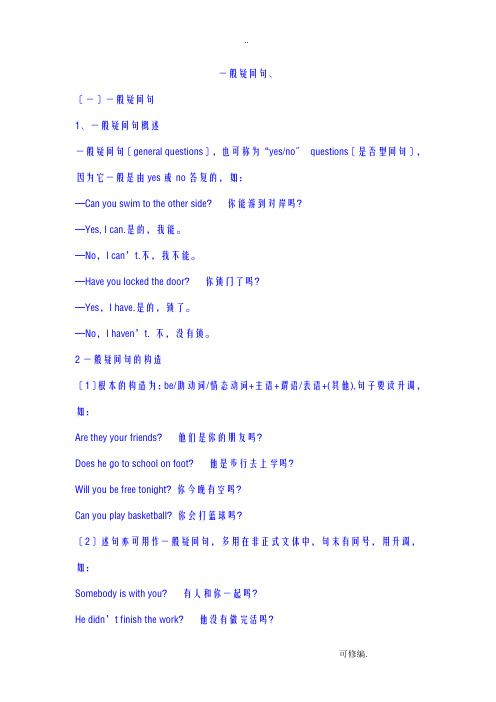
一般疑问句、〔一〕一般疑问句1、一般疑问句概述一般疑问句〔general questions〕,也可称为“yes/no〞questions〔是否型问句〕,因为它一般是由yes或no答复的,如:—Can you swim to the other side?你能游到对岸吗?—Yes, I can.是的,我能。
—No,I can’t.不,我不能。
—Have you locked the door?你锁门了吗?—Yes,I have.是的,锁了。
—No,I haven’t. 不,没有锁。
2一般疑问句的构造〔1〕根本的构造为:be/助动词/情态动词+主语+谓语/表语+(其他),句子要读升调,如:Are they your friends?他们是你的朋友吗?Does he go to school on foot?他是步行去上学吗?Will you be free tonight?你今晚有空吗?Can you play basketball?你会打篮球吗?〔2〕述句亦可用作一般疑问句,多用在非正式文体中,句末有问号,用升调,如:Somebody is with you?有人和你一起吗?He didn’t finish the work?他没有做完活吗?You are fresh from America,I suppose?我猜,你刚从美国回来吧?3、一般疑问句的答语〔1〕一般疑问句一般由yes或no来答复,如:—Are you tired?你累了吗?—Yes,I am.是的,累了。
—No, I’m not.不,不累。
—Does she do the cleaning?她扫除了吗?—Yes ,she does.是的,她清扫了。
—No,she doesn’t.不,她没清扫。
〔2〕答复一般疑问句除了用yes或no外,也可用certainly,probably,perhaps,of course,all right,with pleasure等代替yes,用never,not at all等代替no,如:—Can you help me?你能帮个忙吗?—Certainly.当然。
初一英语一般疑问句试题

初一英语一般疑问句试题1.—________?—He has big eyes and a small nose.A.What does he look like B.What does he doC.How old is he D.How is he【答案】A【解析】句意:—他长得什么样子的?—他有大眼睛小鼻子。
根据答语,是在询问人的长相,B 询问职业;C询问年龄;D询问身体状况,故选A。
【考点】考查特殊疑问句。
2.—_____? —Sorry, I can’t.A.Can you play the drums B.Do you drawC.Are you here D.Can your brother dance【答案】A【解析】考查一般疑问句。
句意为:----你会打鼓吗?----抱歉,我不会。
从答语看,应该是can 开头的一般疑问句,而且主语是you, 故选A。
【考点】考查一般疑问句。
3. ---________?----They’re fine, thanks.A.Are they your grandparents B.Do you like your grandparentsC.How are your grandparents D.Where are your grandparents【答案】C【解析】句意:-你的爷爷奶奶还好吗?-他们很好,谢谢。
根据这个对话的答语可知,这里应该是在问…好吗。
A选项意为:他们是你的爷爷奶奶吗?这是一个一般疑问句,应该用Yes 或No来回答;B选项意为:你喜欢你的爷爷奶奶吗?这也是一个一般疑问句;C你的爷爷奶奶还好吗?D选项是你的爷爷奶奶在哪里?根据句意可知选C。
【考点】考查情景对话。
4.– Did you see any cows ?– ___________.A.Yes, I did B.Yes, I do C.No, I don’t.D.No, I’m not.【答案】A【解析】考查一般疑问句。
英语反义疑问句的问句与回答归纳

英语反义疑问句用法讲解一、基本概念及结构:反义疑问句又叫附加疑问句,是指当提问的人对前面所叙述的事实不敢肯定,而需要向对方加以证实时所提出的问句。
其结构为:前一部分是一个陈述句,后一部分是一个简短的问句。
完成后一部分简短问句时,要根据前面陈述句的动词时态和人称来选择适当的助动词进行提问,前后两部分的人称和动词时态要保持一致。
如果前一部分用肯定式,后一部分一般用否定式;反之,前一部分为否定式,后一部分要用肯定式,即“前肯定后否定,前否定后肯定”。
例如:You don’t like rock music, do you? 你不喜欢摇滚乐,对吧?二、反义疑问句的回答不管是前否后肯,还是前肯后否形式的反义疑问句,回答都根据事实回答,肯定的答案就用yes+肯定结构,否定的答案就用no+否定结构,答案要和实际情况相符。
也叫实事求是例如:1、--She is good at English, isn't she?--Yes, she is. 是的,她擅长或者No, she isn't.不,她不擅长2、--There isn't a computer in you r room, is there?“你的房间里没有电脑,对吗? -- Yes, there is.不,有电脑或者 No,there isn't.是的,没有电脑。
三、其他规则:1、陈述部分用否定词或半否定词 no , nothing, nobody, never, few, seldom, hardly, rarely, little 等否定含义的词时,疑问部分用肯定形式。
例如:He is never late for school, is he?他上学从不迟到,是吗?2、陈述部分的谓语是used to 时,疑问部分用didn’t +主语或 usedn’t +主语。
例如:He used to take pictures there, didn’t / usedn’t he? 他过去常常在那儿拍照,是吗?You used to sleep with the windows open, usedn’t/ didn’t you?你过去常常开着窗户睡觉,是吗?3、陈述部分为祈使句时,祈使句后加附加问句,不表示反意,而表示一种语气。
《易错题》初中英语七年级下册Unit 5知识点(专题培优)
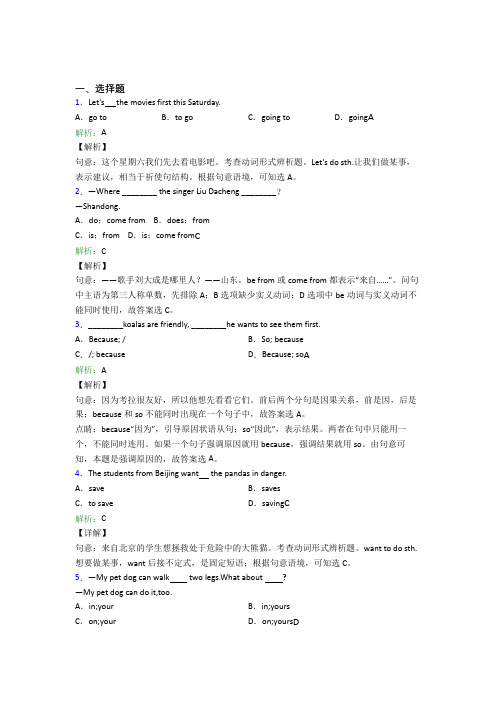
一、选择题1.Let’s the movies first this Saturday.A.go to B.to go C.going to D.going A解析:A【解析】句意:这个星期六我们先去看电影吧。
考查动词形式辨析题。
Let’s do sth.让我们做某事,表示建议,相当于祈使句结构。
根据句意语境,可知选A。
2.—Where ________ the singer Liu Dacheng ________?—Shandong.A.do;come from B.does;fromC.is;from D.is;come from C解析:C【解析】句意:——歌手刘大成是哪里人?——山东。
be from或come from都表示“来自……”。
问句中主语为第三人称单数,先排除A;B选项缺少实义动词;D选项中be动词与实义动词不能同时使用,故答案选C。
3.________koalas are friendly, ________he wants to see them first.A.Because; / B.So; becauseC./; because D.Because; so A解析:A【解析】句意:因为考拉很友好,所以他想先看看它们。
前后两个分句是因果关系,前是因,后是果;because和so不能同时出现在一个句子中,故答案选A。
点睛:because“因为”,引导原因状语从句;so“因此”,表示结果。
两者在句中只能用一个,不能同时连用。
如果一个句子强调原因就用because,强调结果就用so。
由句意可知,本题是强调原因的,故答案选A。
4.The students from Beijing want the pandas in danger.A.save B.savesC.to save D.saving C解析:C【详解】句意:来自北京的学生想拯救处于危险中的大熊猫。
考查动词形式辨析题。
- 1、下载文档前请自行甄别文档内容的完整性,平台不提供额外的编辑、内容补充、找答案等附加服务。
- 2、"仅部分预览"的文档,不可在线预览部分如存在完整性等问题,可反馈申请退款(可完整预览的文档不适用该条件!)。
- 3、如文档侵犯您的权益,请联系客服反馈,我们会尽快为您处理(人工客服工作时间:9:00-18:30)。
英语中答yes或no是根据事实回答,事实是就回答yes,不是就回答no,举例子为例:You aren't Michael?
如果你是Michael就回答:yes,i am (Michael) . 如果不是就回答:no,i am not (Michael).不管问题怎么问,不要受到问题影响,你是Michael,就说yes,是。
你不是Michael,就说no,不是。
You won't go shopping with her this afternoon ,will you?
No ,I won't.( 是的,我不去)Yes ,I will.( 不,我会去的)
中文习惯:回答针对的是对方的话语观点而非事实,对方提出什么观点,你就对他这个观点进行正确或错误判断,因此你的观点对了,我就回答" 是
" ,你的观点错了,我就回答" 否" 。
但英语的习惯则是针对对方
所说的事实——只要是肯定性事实,我就回答"Yes" 只要是否定性事实,回答就是"No" 。
不管你是怎么提出的观点,只看事实是不是这样的,是就回答YES,不是就是NO。
